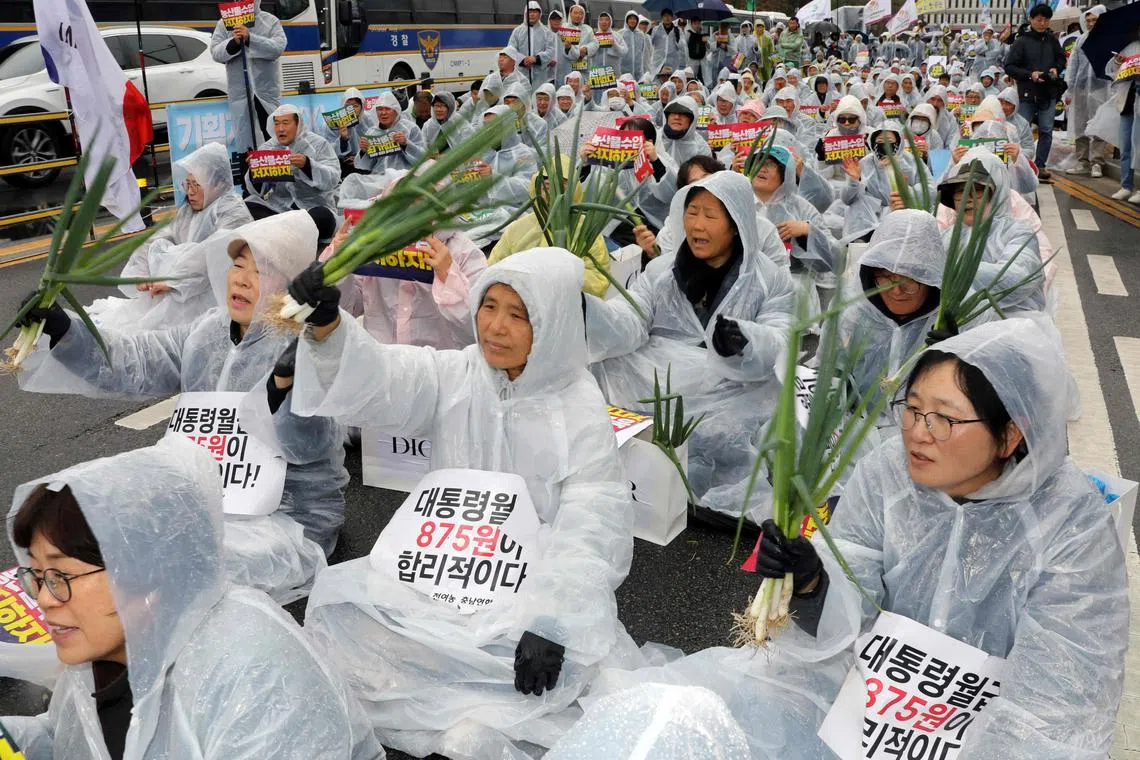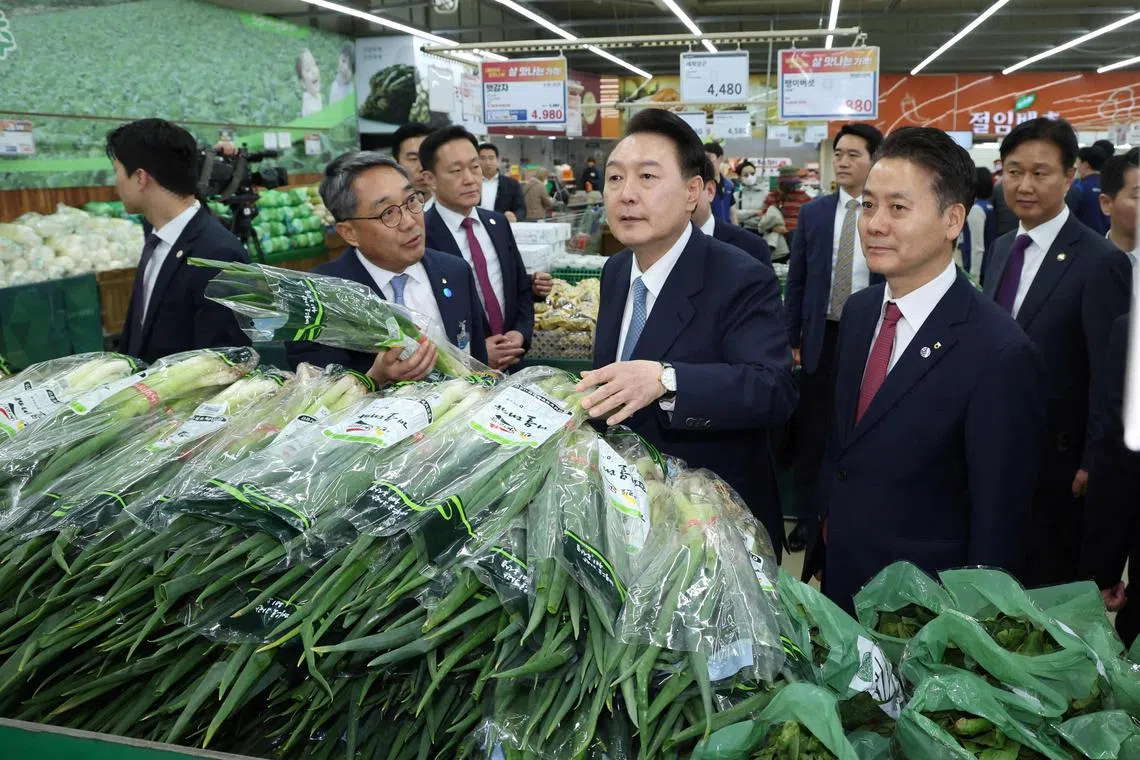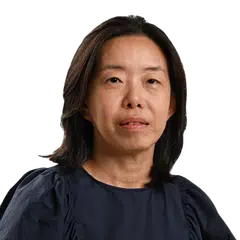Surging fruit and vegetable prices a hot issue in South Korea’s legislative election
Sign up now: Get insights on Asia's fast-moving developments

South Korean farmers rallying for the abolition of imported agricultural products outside Government Complex Sejong in March.
PHOTO: AFP
SEOUL - Apples and green onions have been stirring up a storm as South Koreans head to the polls on April 10.
Apart from controversies such as a scandal over a Dior handbag gifted to First Lady Kim Keon-hee
South Korean President Yoon Suk-yeol and his ruling People’s Power Party (PPP) are hoping to win back control of the legislature from the main opposition Democratic Party of Korea (DP).
But Mr Yoon is in a bit of a pickle after a visit to a supermarket on March 18, where he picked up a bunch of green onions priced at 875 won (87 Singapore cents) per kg and declared the price “reasonable”.
This was actually a special promotional price and not a reflection of the prevailing market price of green onions, which was as high as 4,000 won per kg then.
The backlash was instant. Opposition politicians gleefully carried bunches of green onions – a staple of Korean cuisine – and ridiculed the President for being out of touch with the masses.
Early voters who went to the polls on the weekend of April 6 and 7
South Korea has an early voting system, introduced in 2014, which allows voters to cast their ballots earlier on predetermined dates, in order to encourage higher voter turnout.
Of some 44.3 million eligible voters, 31.3 per cent have already cast their ballots through the early voting system in a record high turnout at this stage of the election. The remaining voters will submit their votes on April 10.
Inflation has emerged as a hot electoral issue.
Consumer prices in South Korea rose by 3.1 per cent in March from a year earlier, official statistics show, with food prices as a whole rising by 6.7 per cent.
Fruit prices, in particular, have shot through the roof – the price of apples hit an all-time high of 9,170 won per kg in March, more than double the 4,106 won per kg just a year ago. This led local media to dub it an “appflation” (combination of apple and inflation) crisis.
Voters, like Madam Kim Soo-young, are more upset with President Yoon’s comment than just the food inflation.
The 50-year-old housekeeper recalled that the price of green onions had risen even higher to peak at nearly 7,000 won a kg in 2021 when Mr Moon Jae-in was president, driving people to grow onions at home and swop cultivation tips on the internet.
But the recent incident showed that President Yoon was uninterested in people’s livelihoods, she said, which is leading her, a swing voter, to cast her vote for the new party Rebuilding Korea Party set up by Mr Yoon’s old foe Cho Kuk.
“Most people can’t buy green onions for 875 won anywhere. Even the apples that we commonly eat have become so expensive. It is not so much a matter of price – what makes people like us angry is that the President does not appear to understand what we are going through.”
Another voter, self-employed Won Yu-byeong, 53, told ST that he feels Mr Yoon’s government’s poor management will set back the country’s economy and growth for several years.
“I will vote to bring down politicians who do not care about the people and only try to keep their positions,” he said.
At a campaign event on April 6, chairman of the ruling PPP, Mr Han Dong-hoon, tried to soothe feathers by apologising for rising food prices. “We should have done better with prices. We did our best, but it was not enough. We will do our best to keep prices down,” he said.
The irony about the stink over green onions is that the low price of 875 won at the supermarket that Mr Yoon visited was a result of the government’s subsidies aimed at bringing down food prices before the election.
In early March, Mr Yoon’s government had announced a 150 billion won fund to stabilise agricultural product prices by subsidising supermarket chains in offering discounts on groceries. The market price of green onions has now fallen to about 2,000 won per kg after government subsidies.
On April 2, Mr Yoon announced an expansion to that plan, promising to inject state funds indefinitely until soaring consumer prices are controlled.

South Korean President Yoon Suk-yeol is in a bit of a pickle after a visit to a supermarket, where he picked up a bunch of green onions priced at 875 won and declared the price “reasonable”.
PHOTO: AFP
Kyonggi University’s professor of political science and law Hahm Sung-deuk told ST that Mr Yoon’s onion gaffe gave the opposition an opportunity to mock him.
“Superficially, it looks like the President doesn’t know what’s going on in the lives of the people. So the opposition was quick to utilise this against him, particularly because he is the incumbent president.”
The legislative election is widely regarded as a referendum on the sitting president and his government’s performance, and such referendums are rarely favourable towards the incumbent, says Prof Hahm.
The PPP has just 114 seats in South Korea’s 300-seat National Assembly, while the DP holds a 156-seat majority.
Mr Yoon and his party need to claw back the majority of seats from the opposition to push through his policies during the remaining three years of his five-year term. Under the Korean Constitution, the presidential term is set at five years and re-election is disallowed.
With Mr Yoon’s approval rating hovering at 35 per cent, it would be “extremely difficult, if not impossible” for the ruling party to fare well in the election, says Sogang University political science professor Kim Jae-chun.
He pointed out that while economic troubles may not be entirely the fault of the current conservative government, the responsibility will always fall on the incumbent.
Referring to the previous liberal administration under then President Moon, Prof Kim said: “The Moon government, as with all liberal governments, was all for deficit spending and expansionary monetary policy before the Covid-19 pandemic and such a spending spree was further escalated during the pandemic.
“The consequence of such a fiscal policy is the kind of inflation that we are seeing here, but it is always the incumbent government that is held accountable.”
Dr Lee Seong-Hyon, a senior fellow at the George H.W. Bush Foundation for US-China Relations, said the April 10 election is also widely seen as a replay of the 2022 presidential election, in which Mr Yoon edged out Mr Lee Jae-myung of the DP with a margin of just 0.7 per cent.
He said the outcome of the election “could set the tone for the next presidential race”, which is due in 2027.
“If Mr Lee’s party wins, then Lee is very likely to become the next president. If Mr Yoon loses, then he will become an early lame-duck president and will have difficulty implementing meaningful political initiatives,” he added.



